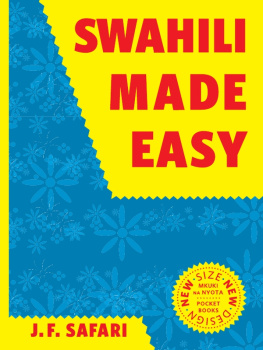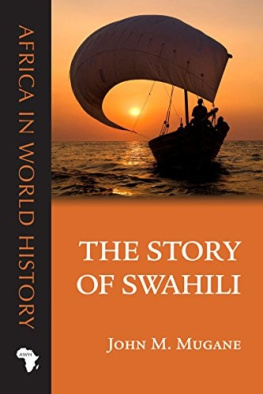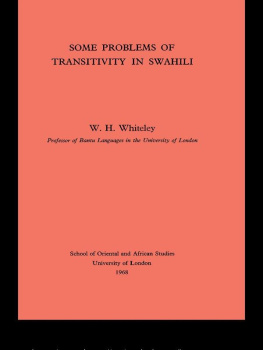This book is a publication of
Indiana University Press
Office of Scholarly Publishing
Herman B Wells Library 350
1320 East 10th Street
Bloomington, Indiana 47405 USA
iupress.indiana.edu
2018 by Kai Kresse
All rights reserved
No part of this book may be reproduced or utilized in any form or by any means, electronic or mechanical, including photocopying and recording, or by any information storage and retrieval system, without permission in writing from the publisher. The paper used in this publication meets the minimum requirements of the American National Standard for Information SciencesPermanence of Paper for Printed Library Materials, ANSI Z39.48-1992.
Manufactured in the United States of America
Cataloging information is available from the Library of Congress.
ISBN 978-0-253-03753-4 (hardback)
ISBN 978-0-253-03754-1 (paperback)
ISBN 978-0-253-03755-8 (ebook)
1 2 3 4 5 23 22 21 20 19 18
The time of existence and experience, the time of entanglement... this time of African existence is neither a linear time nor a simple sequence in which each moment effaces, annuls, and replaces those that preceded it, to the point where a single age exists within society. This time is not a series but an interlocking of presents, pasts, and futures that retain their depths of other presents, pasts and futures, each age bearing, altering, and maintaining the previous ones.
... It may be supposed that the present as experience of a time is precisely that moment when different forms of absence become mixed together: absence of those presences that are no longer so and that one remembers (the past), and absence of those others that are yet to come and are anticipated (the future).
A. Mbembe, On the Postcolony (2001, p. 16)
The thoughts of a people distant in time or space cannot be at all deeply shared without our becoming acquainted with things and ideas important to them but of which we have no exact equivalent. As far as possible, one wants to read the works themselves in which the thoughts have been expressed; in these, even in translation, the special concepts and categories of the writers, as well as the personalities and places referred to, must be reproduced (if the translation is serious) in forms alien to the usual flow of English, no matter how much the resources of English may have been adapted or even twisted to do duty for what remain alien conceptions.
The same is, in some degree, true of any work treating of the alien civilization. The serious reader must be prepared to think in novel ways. To this end, he must be prepared to absorb as readily as possible a whole range of new concepts and terms. Otherwise he cannot expect to profit seriously by a study of the culture; at most he will receive an impression of exotic quaintness, romance, or incongruity which does no justice to the human reality.
On Making Sense of Islamicate Words, Names and Dates, M. Hodgson, The Venture of Islam: Conscience and History in a WorldCivilization, vol. I (1977 [orig. 1958], p. 3)
Two Entry Points
At the turn of this century, the Cameroonian philosopher and anthropologist Achille Mbembe (1992; 2001) presented us with critical inventories and stimulating conceptualizations of postcolonial experience in Africa. He combined a critique of autocratic rule, narrated as a description of its common patterns (and those of popular resistance in response), with a critique of a history of Eurocentric scholarship that continued dismissing and obscuring Africas lived subjectivities and actual realities. Mbembes vivid accounts are full of perceptive observations on political dynamics and everyday life that feed into a critique that is frank, piercing, and stimulating, often picking up on the real-life satires that the post-colony creates and ordinary people have to endure. On the research front, he criticized an increasing lack of fieldwork, a lack of knowledge of local languages, and a low sense of (and sensitivity for) human and intellectual agency in Africa (2001, 7). My study here speaks to these points (which have also been flagged by other critical Africanist researchers), as I provide ethnographically contextualized readings and discussions of postcolonial experience and intellectual practice on the Kenyan Swahili coast.
In the second epigraph, from almost half a century earlier, Marshal Hodgson called upon researchers to acquire familiarity with and convey a deep understanding of Muslim societies and life-worlds, in their own terms and through the words used by social actors (and thus sensitive to language in a way that is no longer self-understood). Reminding ourselves of Hodgsons commitment is not a bad entry point for a study such as this one. This book explores how coastal Muslims in postcolonial Kenya address and negotiate the conceptual and political challenges they confront in their everyday lives, by drawing from the rich resource of genres and discursive strategies that Swahili language and culture provide. Such creative conceptual (and largely discursive) activity occurs in response to practical demands, is framed in political or religious terms, and is embedded in historical continuities of language use, forms of interaction, and mutual normative expectations among community members. In short, it happens in a social field of intellectual practice.
Around the time of Hodgsons writing, Seyid Qutb was one of the most critical and most influential modern Islamic thinkers, an author whom some of my Swahili interlocutors pointed to as inspirational. Qutb lamented that colonized Muslims around the world had neglected their own forms and histories of intellectual practice, which they could have used to reassert themselves and to counter the pressing global political imbalance. Instead, he wrote, they were simply copying the principles and practices pursued by the representatives of the European empires: Here in Egypt and in the Muslim world as a whole, we pay little heed to our native spiritual resources and our own intellectual heritage; instead, we think first of importing foreign principles and methods, or borrowing customs and laws from across the deserts and from beyond the seas (Qutb 2000 [orig. 1953], 19). Qutbs regret about such neglect of ones own intellectual heritage that should have been brought to bear in struggles against external domination and for the building of future political visions for ones society was shared, among others, by East African Muslims. In the early 1930s, already Sheikh Al-Amin Mazruis pamphlets voice similar sentiments. This book discusses the discursive activity of individual figures advocating religiously guided forms of social reform on the Swahili coast at different points in time both before and after Qutb made this statement. Overall, this book works through the dynamics of continuity and change within the wider field of intellectual practice on the Swahili coast, in terms of language use and the verbal arts, as well as the ongoing social significance of poetic genres, but also in terms of its use for religious and/or political expression, discussion, and contestation.







